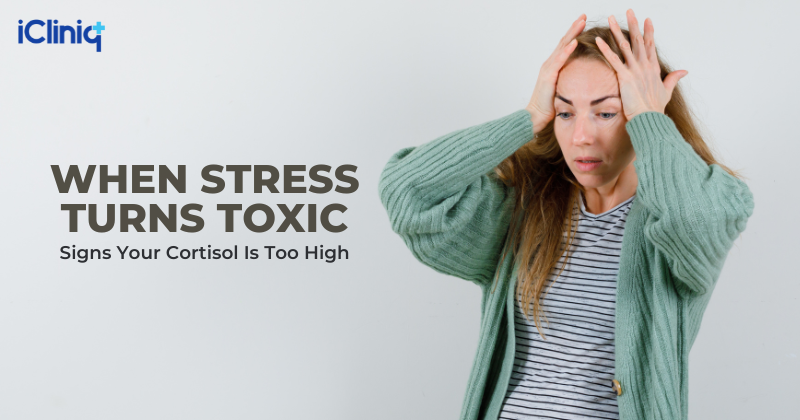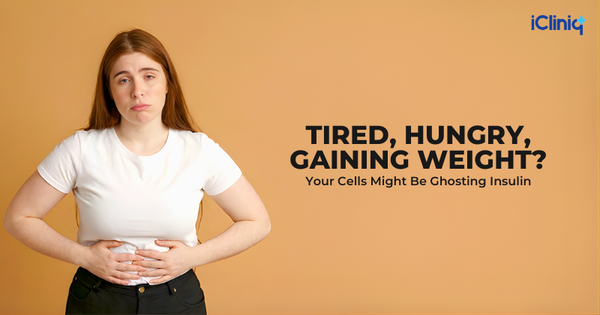When Stress Turns Toxic: Signs Your Cortisol Is Too High

Stress isn't always bad. Your body actually needs it in small doses. But when your stress sticks around too long, it can turn toxic. And the real villain behind this? Cortisol, your body's "stress hormone."
Let's dive into what cortisol does, what happens when it's too high, and how you can bring it back under control.
Cortisol: Your Body's Alarm System
Cortisol is released by your adrenal glands when you face pressure, fear, or any perceived threat. It gives you energy, keeps you alert, and helps you survive. But here's the twist: when cortisol stays high for too long, it can do more harm than good. It starts draining your energy, messing with your metabolism, and disturbing your emotional balance.
How High Cortisol Shows Up in Your Life?
It's not just stress; high cortisol can sneak into your life through constant fatigue, sleep disturbances, or stubborn weight gain. You may be more irritable, anxious, or even facing digestive issues without realizing cortisol could be the root cause. Understanding these subtle signs is key to regaining balance and protecting long-term health.
- Mood Swings and Anxiety - You feel edgy, irritable, or even emotionally numb. Chronic cortisol overload wears down your resilience and clarity.
- Can't Sleep, Can't Function - You lie awake staring at the ceiling—your mind buzzing with to-do lists. High cortisol hijacks your sleep-wake cycle, leading to insomnia or unrestful sleep.
- Weight Gain, Especially Around the Belly - Cortisol sends fat straight to your waistline. If you've got a "stress belly," it's not just diet—it's your hormones crying for help.
- Digestive Distress - Do you experience indigestion, bloating, or bathroom issues often? Cortisol interferes with your gut function, throwing your digestion into chaos.
- Muscle Weakness and Tension - Chronic stress can leave your muscles tight, sore, or exhausted, even if you haven't hit the gym.
- You Keep Getting Sick - High cortisol suppresses your immune system. Stress could be the culprit if you catch every bug or it takes forever to recover.
- Skin Troubles - Do you have breakouts, eczema, or psoriasis flare-ups? Cortisol increases oil production and inflammation, both of which show up on your skin.
What's Causing Your Cortisol to Spike?
You might see a spike in your cortisol levels owing to the following reasons:
- Work Pressure – Tight deadlines, long hours, and burnout are major stressors.
- Financial Worries – Money trouble keeps your mind racing, even when your body's ready to rest.
- Relationship Stress – Conflict or emotional disconnect in personal relationships raises emotional stress.
- Chronic Illness or Pain – Dealing with a long-term condition can keep your body in a constant state of alert.
- Poor Diet – Too much sugar, caffeine, or processed food can spike cortisol.
- Sleep Deprivation – The less you sleep, the more cortisol your body pumps out.
How to Lower Cortisol and Reclaim Your Calm
- Practice Relaxation - Try deep breathing, guided meditation, or mindfulness. Just 10 minutes a day can calm your mind and lower cortisol.
- Move Your Body - Exercise doesn't just burn calories—it burns off stress. Even a brisk walk or stretch session can help.
- Eat Smart - Ditch the processed snacks. Choose whole foods, leafy greens, lean protein, and omega-3s to nourish your hormones.
- Fix Your Sleep Routine - Wind down without screens, keep a cool room, and aim for 7–9 hours of rest. Your hormones will thank you.
- Talk It Out - Whether it's a therapist, friend, or family member, talking reduces emotional weight and helps process stress.
- Make Time for Joy—Read, paint, dance, or write a journal. Do something that makes you happy daily. It's not a luxury; it's therapy.
Listen to What Your Body Is Telling You
When stress stops being helpful and starts running your life, it's time to act. High cortisol can quietly sabotage your health, but you can take control. Recognize the signs, reset your habits, and bring peace back into your body.





